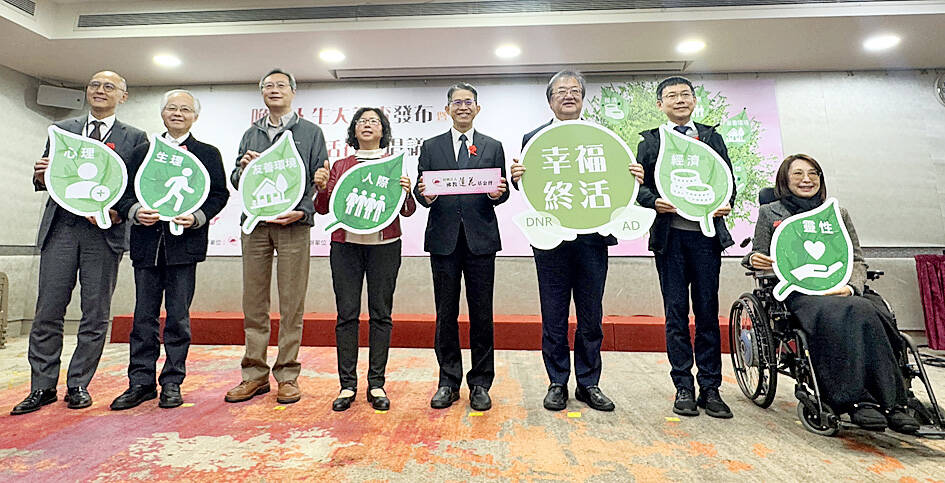The government on Friday pledged to increase subsidies for “good death” procedures, while a hospice care foundation unveiled a poll in which 90 percent of respondents aged 50 and above agreed with the concept of natural death.
The Buddhist Lotus Hospice Care Foundation’s poll was held from June to August last year.
Huang Tsung-cheng (黃宗正), chairman of the foundation and National Taiwan University Hospital’s Department of Psychiatry, said that while the nation’s average lifespan is 80 years, healthy life expectancy is 73.

Photo: Chiu Chih-jou, Taipei Times
This discrepancy means that an average elderly person spends the last few years of their life suffering, he said.
As one in five people in Taiwan are aged 65 or above, the issue of good death is becoming increasingly important, he added.
Citing the foundation’s poll, he said that while 90 percent of respondents agreed with the concept of natural death, only 15 percent had completed a “do not resuscitate” (DNR) instruction.
The percentage of respondents having an “advanced decision to refuse treatment” (ADRT) statement was even lower, he added.
The poll results highlight a lack of general knowledge about such documents, resulting in a lack of willingness to sign them, he said.
The willingness of the family and the costs involved often play a large part in the decision process, he said.
Minister of Health and Welfare Chiu Tai-yuan (邱泰源) on Friday said that without an ADRT statement or DNR instruction, hospitals are obligated to perform certain procedures, such as intubation, cardiac compression and cardiopulmonary resuscitation, to resuscitate a person before they are sent to an intensive care unit.
Such procedures often prolong the person’s life for several days but can cost up to NT$500,000, Chiu said.
Such procedures only delay the inevitable and cause unnecessary suffering to the person, he said.
Such procedures occupy emergency medical resources that could be used in other situations, he said.
Signing an ADRT statement requires an Advance Care Planning (ACP) session that is not covered by subsidies or the National Health Insurance (NHI), and hospitals usually charge NT$3,000 to NT$3,500 for consultation, Chiu said.
These costs are a significant factor preventing people from signing an ADRT statement, he said.
The Ministry of Health and Welfare allows consultation fees for four main categories of people, including those who are terminally ill, to be covered by the NHI, Chiu said, adding that such incentives have led to an increased percentage of people signing ADRT statements and DNR instructions.
The ministry has asked the National Health Insurance Administration to promote and increase subsidies for ACP sessions to waive emergency medical treatment for people so that they have a dignified passing, he added.

A preclearance service to facilitate entry for people traveling to select airports in Japan would be available from Thursday next week to Feb. 25 at Taiwan Taoyuan International Airport, Taoyuan International Airport Corp (TIAC) said on Tuesday. The service was first made available to Taiwanese travelers throughout the winter vacation of 2024 and during the Lunar New Year holiday. In addition to flights to the Japanese cities of Hakodate, Asahikawa, Akita, Sendai, Niigata, Okayama, Takamatsu, Kumamoto and Kagoshima, the service would be available to travelers to Kobe and Oita. The service can be accessed by passengers of 15 flight routes operated by

MORE FALL: An investigation into one of Xi’s key cronies, part of a broader ‘anti-corruption’ drive, indicates that he might have a deep distrust in the military, an expert said China’s latest military purge underscores systemic risks in its shift from collective leadership to sole rule under Chinese President Xi Jinping (習近平), and could disrupt its chain of command and military capabilities, a national security official said yesterday. If decisionmaking within the Chinese Communist Party has become “irrational” under one-man rule, the Taiwan Strait and the regional situation must be approached with extreme caution, given unforeseen risks, they added. The anonymous official made the remarks as China’s Central Military Commission Vice Chairman Zhang Youxia (張又俠) and Joint Staff Department Chief of Staff Liu Zhenli (劉振立) were reportedly being investigated for suspected “serious

ENHANCING EFFICIENCY: The apron can accommodate 16 airplanes overnight at Taoyuan airport while work on the third runway continues, the transport minister said A new temporary overnight parking apron at Taiwan Taoyuan International Airport is to start operating on Friday next week to boost operational efficiency while the third runway is being constructed, the Ministry of Transportation and Communications said yesterday. The apron — one of the crucial projects in the construction of the third runway — can accommodate 16 aircraft overnight at the nation’s largest international airport, Minister of Transportation and Communications Chen Shih-kai (陳世凱) told reporters while inspecting the new facility yesterday morning. Aside from providing the airport operator with greater flexibility in aircraft parking during the third runway construction,

American climber Alex Honnold is to attempt a free climb of Taipei 101 today at 9am, with traffic closures around the skyscraper. To accommodate the climb attempt and filming, the Taipei Department of Transportation said traffic controls would be enforced around the Taipei 101 area. If weather conditions delay the climb, the restrictions would be pushed back to tomorrow. Traffic controls would be in place today from 7am to 11am around the Taipei 101 area, the department said. Songzhi Road would be fully closed in both directions between Songlian Road and Xinyi Road Sec 5, it said, adding that bidirectional traffic controls would